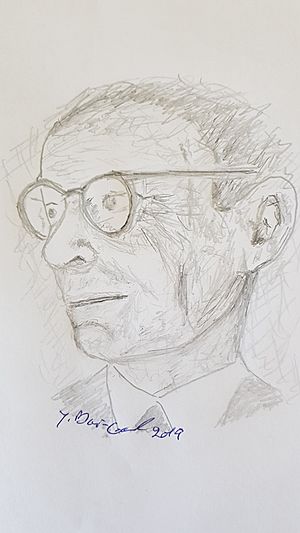Walter Christaller facts for kids
Quick facts for kids
Walter Christaller
|
|
|---|---|

Sketch of Walter Christaller
|
|
| Born | April 21, 1893 Berneck, Württemberg
|
| Died | March 9, 1969 (aged 75) Königstein im Taunus, Hesse
|
| Nationality | German |
| Known for | Central place theory |
| Scientific career | |
| Fields | Geography |
| Doctoral advisor | Robert Gradmann |
Walter Christaller (born April 21, 1893 – died March 9, 1969) was a German geographer. He is best known for his important idea called the Central place theory. He first shared this theory in 1933.
This theory changed how people studied cities. Instead of looking at cities one by one, Christaller helped us see them as connected systems. He focused on how towns work as economic centers. He also looked at how towns in the same area relate to each other.
Contents
Christaller's Life Story
Walter Christaller was born in Berneck, Germany. His mother, Helene Christaller, wrote Christian children's books. His grandfather, Johann Gottlieb Christaller, was a linguist and a missionary in West Africa.
Early Life and Education
Before 1914, Christaller started studying philosophy and economics. He then served in the German Army during World War I. He was taught at home and also studied at the Universities of Heidelberg and Munich.
In the 1920s, he worked in many different jobs. In 1929, he went back to school to finish his studies. This led to his famous work on Central Place Theory. He published it in 1933 as The Central Places in Southern Germany.
Work During World War II
In the late 1930s, Christaller worked briefly at the University of Freiburg. During Second World War, he worked for the government. His job was to help plan how the economy and geography of certain areas would be organized. He used his Central Place Theory to guide this planning. Another German geographer, August Lösch, also expanded on his work.
After the War
After the war, Christaller became involved in politics. He also focused on the geography of tourism. From 1950, his Central Place Theory was used in Federal Republic of Germany. It helped to reorganize how towns and their borders were set up. This system is still used today.
In 1950, Christaller helped start the German Association of Applied Geography (DVAG). There is an award named after him, called the Walter Christaller Award for Applied Geography.
He passed away in Königstein im Taunus, West Germany, on March 9, 1969.
See also
- List of geographers
 In Spanish: Walter Christaller para niños
In Spanish: Walter Christaller para niños
 | James B. Knighten |
 | Azellia White |
 | Willa Brown |

